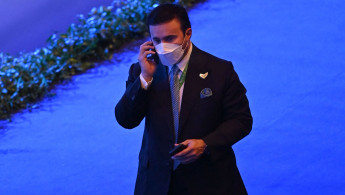France opens torture case against Interpol's Emirati head Ahmed Nasser al-Raisi
French authorities have opened a case against Interpol president Ahmed Nasser al-Raisi of the UAE over accusations of torture and arbitrary detention by two Britons who were detained in the country, a source close to the inquiry told AFP on Wednesday.
The case into suspected complicity in torture by the top Emirati official was confirmed by France's anti-terror prosecutors office (PNAT), which has handed it to an investigating magistrate who will now decide whether to press charges.
'al-Raisi could potentially be detained for questioning in France if his visits the country. Interpol's headquarters are in the southeastern French city of Lyon.'https://t.co/40tue2FUpK
— Kristian Ulrichsen (@Dr_Ulrichsen) May 11, 2022
The two Britons, Matthew Hedges and Ali Issa Ahmad, accuse al-Raisi of having ultimate responsibility - as a senior interior ministry security official - for the torture and arbitrary detention they say they suffered in the UAE.
The UAE has tortured countless human rights activists and other detainees, human rights groups have said.
The source said the investigating magistrate must also decide if al-Raisi, who was elected Interpol president in November, enjoys diplomatic immunity from prosecution in France.
The Britons filed the complaint under France's principle of universal jurisdiction, which allows it to prosecute serious crimes even if they are committed on foreign soil.
This means al-Raisi could potentially be detained for questioning if he visits the country. Interpol's headquarters are in the southeastern French city of Lyon.
He is believed to have visited Lyon several times since January.
The case against al-Raisi, opened in late March, goes a step further than the torture inquiry opened against him by French prosecutors in November, over the detention of UAE pro-democracy campaigner Ahmed Mansoor.
At the time, the UAE's foreign ministry rejected the complaints about Mansoor's detention conditions as "without foundation".
Mansoor was sentenced to 10 years in prison in 2018, on accusations of spreading false information in social media posts - a verdict that activists said showed there was no space for free expression in the UAE.
Human rights groups and activists have highlighted the harrowing conditions he has been subject to in detention, including solitary confinement and being deprived of basic necessities.
In the latest case, the inquiry is now in the hands of an investigating magistrate, a step that precedes the pressing of any charges.
Contacted by AFP, the UAE embassy in Paris declined to comment.
Both plaintiffs were in Paris on Wednesday to testify before the investigating magistrate.
Hedges, an academic specialising in the UAE, says he was detained and tortured in the country from May to November 2018 after being arrested on charges of espionage during a study trip.
At a press conference in Lyon last October, he said he had been forced to make false confessions that led to a sentence of life imprisonment before his release under international pressure led by the UK.
Ahmad, meanwhile, says he was repeatedly beaten and even stabbed during a month in detention in January 2019, allegedly for enthusiastically supporting the UAE's Gulf rival Qatar in a football clash.
In a statement, Hedges said it was a "real moment of pride" to give evidence to the magistrate about the torture he says he suffered.
"Given the human rights record of the UAE it was incredible that al-Raisi was even elected as president. The torture that myself, Ali, and countless other people in the UAE have suffered is unfortunately the norm in the UAE," he said.
Ahmad said: "So many times I have lost hope that al-Raisi and all the other men that did this to me would get away with it with total impunity, but today is a good day."
They have also initiated legal action against al-Raisi in Norway, Sweden and Turkey.
Al-Raisi's four-year term at Interpol is largely ceremonial, with Secretary General Juergen Stock handling day-to-day management of the organisation.
His candidacy for the Interpol job prompted an outcry from activists, who pointed to the generous funding Interpol receives from the United Arab Emirates.





 Follow the Middle East's top stories in English at The New Arab on Google News
Follow the Middle East's top stories in English at The New Arab on Google News


